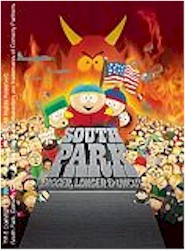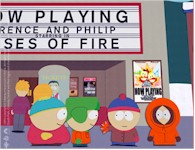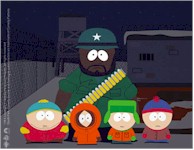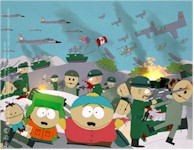|
| |
South Park: Bigger,
Longer, and Uncut
Review by Joe Barlow
Posted 9 July 1999
 |
|
Directed by Trey Parker Starring
the voices of Trey Parker,
Matt Stone, Isaac Hayes,
Mary Kay Bergman, Minnie Driver,
and George Clooney
Written by Trey Parker,
Matt Stone, and Pam Brady |
"This movie has warped my fragile little
mind."
-Eric Cartman, "South Park: Bigger, Longer and Uncut"
 The above quote
from Eric Cartman could easily function as a one-sentence review of the new animated film
in which he stars. I never thought I'd see the day when a cartoon about potty-mouthed
children, a sex-obsessed cafeteria cook, and a piece of singing feces became not only
acceptable television programming, but a national phenomenon as well. God bless America.
Since debuting on Comedy Central in 1997, South Park has continually pushed the
envelope of good taste and challenged the conventional idea of what is and is not
appropriate for television. The battle has not been an easy one: since the very first
episode was aired, the network has been besieged by letters from angry parents, religious
organizations, and nearly every political group in the country, all demanding the
immediate cancellation of the series. But the proof is in the Snacky Cakes: Trey Parker
and Matt Stone, the show's creators, have demonstrated that poo-poos and profanity can not
only entertain the masses, they can also mean big merchandising dollars. Now they're
gambling that they can take the premise (and its profits) to the next level. The above quote
from Eric Cartman could easily function as a one-sentence review of the new animated film
in which he stars. I never thought I'd see the day when a cartoon about potty-mouthed
children, a sex-obsessed cafeteria cook, and a piece of singing feces became not only
acceptable television programming, but a national phenomenon as well. God bless America.
Since debuting on Comedy Central in 1997, South Park has continually pushed the
envelope of good taste and challenged the conventional idea of what is and is not
appropriate for television. The battle has not been an easy one: since the very first
episode was aired, the network has been besieged by letters from angry parents, religious
organizations, and nearly every political group in the country, all demanding the
immediate cancellation of the series. But the proof is in the Snacky Cakes: Trey Parker
and Matt Stone, the show's creators, have demonstrated that poo-poos and profanity can not
only entertain the masses, they can also mean big merchandising dollars. Now they're
gambling that they can take the premise (and its profits) to the next level.
South Park: Bigger, Longer and Uncut is ninety minutes of nearly continuous
profanity, vomiting, sexual innuendoes and fart gags. It's crude, horrifying, shocking,
disturbing... and the funniest movie I've seen since 1993's Clerks.
In the small "redneck mountain town" (according to the opening song) of South
Park, Colorado, life is quiet and peaceful -- idyllic, even. But the town's solitude is
challenged when a new film opens at the local theater: Asses of Fire, starring
Canada's Terrence and Phillip (a comedy duo whose schtick revolves entirely around their
ability to fart on cue). Four of the local children (Eric Cartman, Stan Marsh, Kyle
Broflovski and Kenny McCormick) sneak in to see the R-rated movie, and are quite taken
with the new vocabulary words contained therein. As is the way with children, they
promptly begin showing off their new arsenal of colorful phrases at every possible
opportunity.
The community is outraged that four pure, innocent children have been corrupted by the
film (apparently they don't watch the South Park TV show), and soon the president
declares all-out war on Canada, the bastion of evil responsible for the offending movie.
Terrence and Philip are sentenced to die, and the boys hatch a plan to save their idols.
Even more is at stake, however: Kenny discovers that if Terrence and Phillip are killed,
Satan and his lover, Saddam Hussein, will gain dominance over the world.
No matter what you may think of the convoluted plot, one has to admire the skill that
has gone into constructing it. South Park is one of those treasured rarities: a
movie that actually enriches the TV show upon which it's based. Once again, envelopes are
pushed to the breaking point (the MPAA initially gave the film an NC-17 rating), and
contemporary topics are brilliantly satirized: look for sly jabs at Jar Jar Binks, racism,
conservative America, and the MPAA itself... not to mention the Broadway musicals from
which the film draws much of its inspiration.
 Yes, that's
right, the film is an all-out musical affair, with lots of singing and dancing. Fear not,
however: unlike those in recent Disney features, these tunes are actually memorable,
managing to stay imbedded in your head for days afterwards. There's "Mountain
Town," the bouncy opening number which extols the virtues of small-town life; the
inspirational "What Would Brian Boitano do?"; the villainous "Blame
Canada" (which recalls the positively evil "Be Prepared," from "The
Lion King"); and a frantic rendition of the toe- tappin' "Kyle's Mom's a
Bitch" (an "It's a Small World"-type sing- along), which is guaranteed to
offend absolutely everyone. Yes, that's
right, the film is an all-out musical affair, with lots of singing and dancing. Fear not,
however: unlike those in recent Disney features, these tunes are actually memorable,
managing to stay imbedded in your head for days afterwards. There's "Mountain
Town," the bouncy opening number which extols the virtues of small-town life; the
inspirational "What Would Brian Boitano do?"; the villainous "Blame
Canada" (which recalls the positively evil "Be Prepared," from "The
Lion King"); and a frantic rendition of the toe- tappin' "Kyle's Mom's a
Bitch" (an "It's a Small World"-type sing- along), which is guaranteed to
offend absolutely everyone.
The irony is that once you get past the language, South Park: Bigger, Longer and
Uncut has a more uplifting message than much of the tripe Disney has drummed out in
the last ten years. It stresses that we are one planet, and we should treat each other's
beliefs with respect and tolerance. It also reminds us that children are people too, and
deserve to be treated as thinking creatures, not something that needs to be coddled and
shielded from the big bad world. Hear, hear.
 Is the movie
actually 'good'? That's totally subjective: after all, how does one rate the artistic
merit of a surprisingly graphic love scene between Satan and Saddam Hussein? Or of
watching a little boy burn himself to death by attempting to light his own flatulance? All
I can say is that the movie made me laugh harder than almost any other I've ever seen, and
I was actually a bit moved by the strangely sweet yet unapologetically ridiculous final
scene. Admittedly, the pace and premise do begin to grow a bit stale by the time the final
twenty minutes roll around, but it's a minor drawback: there's so much to see and hear in
the first hour that I don't think any fan could possibly be disappointed. If you think
you've got the stomach for it, you'll be hard-pressed to find a more daring comedy. Is the movie
actually 'good'? That's totally subjective: after all, how does one rate the artistic
merit of a surprisingly graphic love scene between Satan and Saddam Hussein? Or of
watching a little boy burn himself to death by attempting to light his own flatulance? All
I can say is that the movie made me laugh harder than almost any other I've ever seen, and
I was actually a bit moved by the strangely sweet yet unapologetically ridiculous final
scene. Admittedly, the pace and premise do begin to grow a bit stale by the time the final
twenty minutes roll around, but it's a minor drawback: there's so much to see and hear in
the first hour that I don't think any fan could possibly be disappointed. If you think
you've got the stomach for it, you'll be hard-pressed to find a more daring comedy.
Oh, and Kenny dies.
Contents | Features | Reviews
| Books | Archives | Store
Copyright © 1999 by Nitrate Productions, Inc. All
Rights Reserved.
| |
|